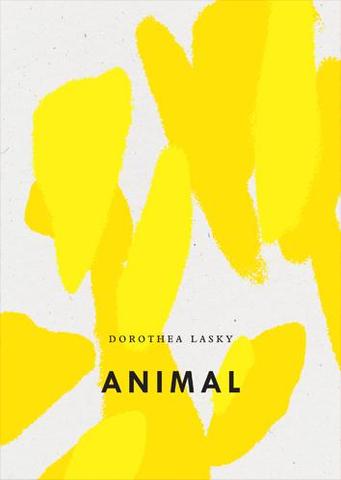
Animal
by Dorothea Lasky
Wave Books, 2019
Review by Jaz Papadopoulos
Dorothea Lasky’s Animal (Wave Books, 2019) is a spiraling revelation of the pure possibility of poetry, disguised as four essays. The essays were originally delivered as lectures for the Bagley Wright Lecture Series, and several have already been published elsewhere, but somehow this amalgam of 111 pages gives the sense of holding something akin to a poetry holy book.
I love this book. I’m kind of obsessed with Lasky. Reading Animal, the question for me was not “is this a ‘good’ book,” but more a feeling of drooly-mouthed hunger for whatever I might learn.
The essays cover the topics of ghosts, colour, wildness, and bees. It references work ranging from Emily Dickinson to The Shining to Nicki Minaj. Horror films are well-represented and analyzed, which makes sense: poems are conversations with the dead; poems give voice to the wild inner animal; poems describe the imaginary, which spans into unending possibility in every direction. The poet is “a monster…with a confusing set of emotions” and a demon-queen living inside.
Each reader of this book will likely come away with a totally different interpretation. For me, the pulsing undercurrent of this book is an imperative akin to an astronaut’s duty to translate the messages from the stars. The poet travels through the imaginary; the poem describes the journey, allowing the reader to step into this now-shared imaginary. “The imagination is a physical space that one shares with other people in and through poetry,” Lasky writes. “When we write poems, what is important about writing them is what we create within the brains of others.”
Inevitably, encountering the imaginary changes us.
A key concept is the metaphysical I, which is different from the self. It is beyond the idea of a singular self, and its multiplicity has no eye for trivial matters such as good or bad or preferable or commodifiable. “A soul is a kind of demon,” she writes, and the I is what has to control the demon. Imagine the ringmaster in a circus (animal cruelty aside).
How does one access the imagination? Easy––talk to ghosts. Allow the inner wild animal some freedom, but give it space––it will creep in like mice into the kitchen at night, and your job is simply to collect and interpret its droppings. Use colour in poems to make the imaginary material, and thus, easier to share.
The essays on ghosts and colour, I found especially instructional and inspiring. Those on beasts and bees were harder to follow, full of sprawling observations that I struggled to connect to poets/poetry. Maybe Lasky is suggesting that bees teach us about intuition, or the power of structure and efficiency (such as the structure of the honeycomb). Or perhaps she is just catching a thread that she’s noticed many other poets have picked up. She writes, “Just like many of the other poets I have discussed … Dickinson makes the work of a poet akin to a bee’s…” Even if we don’t understand it yet, must we not step into the imagination of the poets who’ve preceded us? To be changed alongside our kin? To listen to the whispers of ghosts, even though it doesn’t make material sense quite yet?
I’m aware as I read that I’m manipulating her words in self-service. I read “We all start small. One cell, one poem,” and I think, yes, a virus starts as one cell and spreads into a global pandemic.
My beliefs of the value of the poetic has paled as I wade through global and personal fear, isolation, scarcity, and mortality. Animal was in no way a “how to be a poet in a pandemic” guidebook, and yet, that’s what it has become for me.
Living in a pandemic is unreal. It was previously unimaginable, and yet, it is here. A few months ago, rent and jobs seemed very real; suddenly, they do not. The impossible is possible, so now I wonder, what else is? (Universal Basic Income, perhaps?)
What is “real” is not as important as what takes up space in our minds. What we perceive and believe will inevitably change us, regardless of its materiality or whether anyone else agrees that it’s real. Calling all demon-queens––believe whatever you want!
Personally, Lasky has convinced me to never underestimate the tragic power of this world, and committed to continually expand my conception of what is possible. To see all red as gold, to talk to ghosts and ask the bees for guidance, and to tell you all what I uncover. Suddenly, the job of the poet is more important now than ever before in my own life. It is time to dream beyond belief.
At the end of it all, this book is really a love poem: “The world is a dirge,” she writes. “Ultimately all you love is a death song. What does poetry teach us? That the death song can be beautiful. That you can lose and lose again, but that people will listen to you.”
Jaz Papadopoulos is an interdisciplinary artist working in experimental writing, installation, and video. They are interested in diaspora, bodies, place, memory, grief and ritual. A graduate of the Cartae Open school, Jaz is also a 2018 Lambda Literary fellow, and a current MFA student at the University of British Columbia. Jaz grew up on Treaty 1 territory and currently lives on unceded Coast Salish land. Follow them online at @scrybabybaby and vimeo.com/jazpapadopoulos